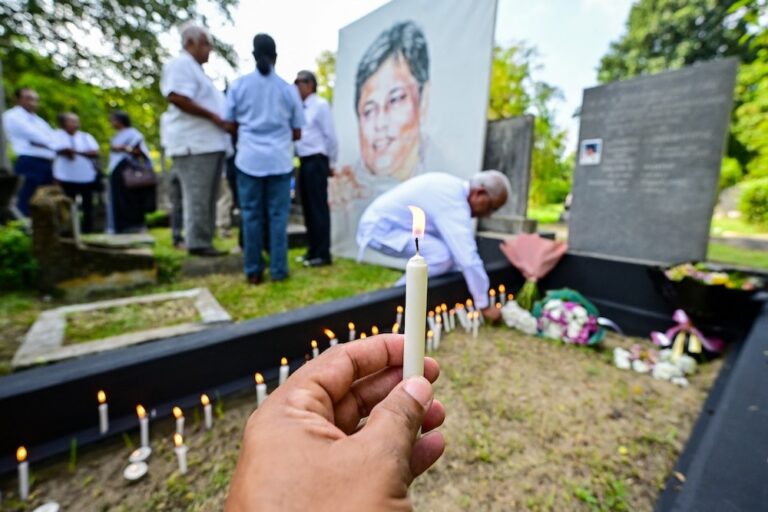Free movement of media personnel in the North and East of Sri Lanka continues be restricted by the government, despite a key recommendation on this very matter by a reconciliation and accountability commission appointed by the President.
(IFJ/IFEX) – November 9, 2012 – “The Government should ensure the freedom of movement of media personnel in the North and East, as it would help in the exchange of information contributing to reconciliation” (Lessons Learnt and Reconciliation Commission, recommendation 9.115-d)
A key recommendation of the Lessons Learned and Reconciliation Commission (LLRC), a commission appointed by the President and lauded as the domestic mechanism for reconciliation and accountability, has yet to see the light of day. Free movement of media personnel in the North and East continues be restricted by the Government.
In mid-October, a TV crew of a local station travelled to the Mullaitivu District, in Northern Sri Lanka, to do a story on people who had left the Menik Farm IDP (internally displaced persons) camp immediately preceding its closure in September 2012.
Before meeting with the IDPs, the TV crew met with the Government Agent (GA) of the Mullaitivu District, who told them they could film the resettlement and relocation areas, and in fact encouraged them to give the story maximum coverage which he hoped, would negate the misrepresentation of facts. Taking into consideration previous restrictions imposed by the military on journalists who had visited the area, the team requested the GA to provide them with written permission to visit Seeniyamottai (people whose land has been occupied by the military have been relocated to Seeniyamottai). The GA informed the crew that because there were no restrictions on journalists visiting the areas concerned, there was no need to obtain written approval.
When the crew reached Seeniyamottai however they faced a different reality. The crew came upon a group of men digging a well and since they indicated their willingness to be filmed and interviewed the crew began filming. As they began filming an Army officer approached them, asked them where they were from, and although he didn’t ask them for any identification he informed them that without prior permission from the Security Forces (SF) Commander they were not allowed to film there. The crew informed him that the GA had informed them that they could film without restriction any civilian resettlement and relocation area, specifically Seeniyamottai. The Army officer insisted that they could not without the permission of the SF Commander.
( . . . )
In Puthukdiriyippu East, the crew was followed by men on bicycles. As the crew was travelling in Mullivaikkal, although there was no established check-point, the crew was stopped by a group of Army officers. The soldiers questioned the crew in an aggressive manner, but didn’t ask them who they were, which infers that the soldiers knew exactly who they were, because their movements were being monitored. One soldier radioed in the message in Sinhala “they are here, and they say they are going to Mullaitivu.” The person on the other end apparently cleared the crew to continue on their journey.
The crew then proceeded on to Puthukudiyiruppu West, where they spoke to a family whose resettlement had been delayed because the Army was occupying their land. Even when the crew visited, the Army was still occupying part of the land and quickly emerged to keep a watchful eye on the crew. Although they didn’t prevent the crew from filming they made their presence felt and questioned them about who they were, where they came from and whether there were there any foreigners on the team.
( . . . )
The crew’s experience is not isolated. Others who attempted to interview IDPs were subjected to intense surveillance and at least three well known journalists (one foreign and two local) had reportedly been prevented from visiting the same IDP camp and were threatened, intimidated and subjected to surveillance.
Conclusion and recommendations
The IFJ has serious concerns regarding the restrictions on media and journalists from having unfettered access to IDPs and those who have been resettled. It is essential that a free exchange of information is fostered in the North and East of the country to ensure that the needs and rights of the people are being fulfilled.
The IFJ calls upon the Sri Lankan Government to uphold the rule of law and ensure that freedom of expression and the right to information are protected.
The IFJ recommends:
* The demilitarization and return to civilian administration of former conflict areas.
* Greater transparency and accountability in the resettlement process.
* Full access to media personnel to all civilian areas in the North.
* Make public any restrictions on media personnel from having free access to the North of the country and the legal basis for these restrictions.
Click here for the full report.


